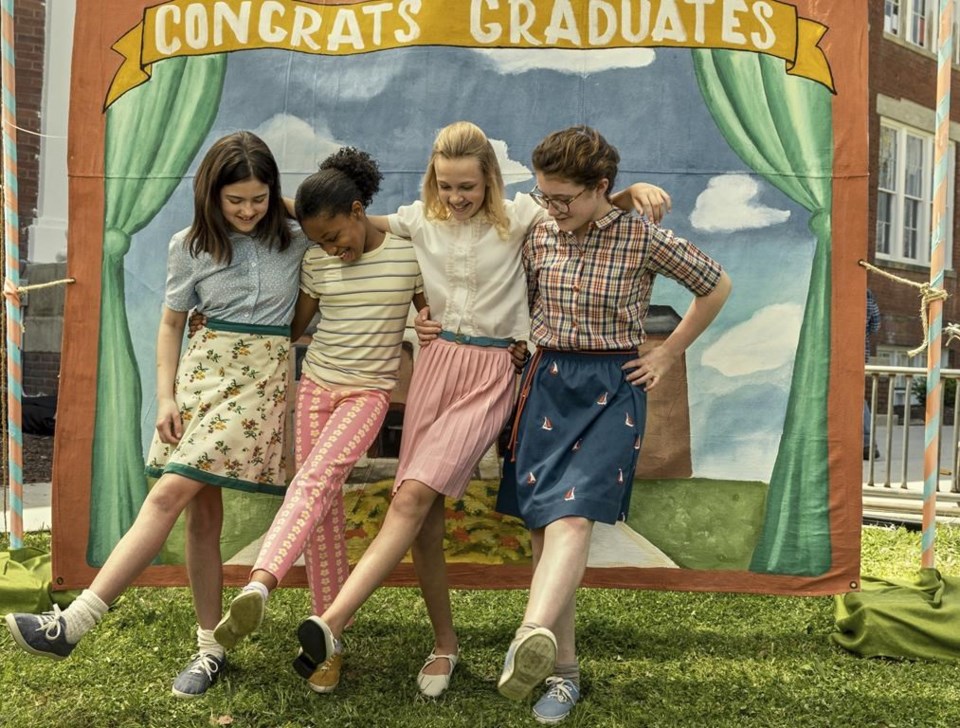There is not a cynical molecule in the big-screen adaptation of ŌĆ£ ,ŌĆØ a sweet, playful and reverential adaptation of famed coming-of-age novel about the everyday problems of an 11-year-old girl.
Perhaps it shouldnŌĆÖt have been earthshattering for for an audience who was going through it, but it was and, in many ways, still is.
In one scene, Margaret (Abby Ryder Fortson), who has not yet started menstruating, decides to get ready for it by buying some pads at the convenience store with her friend Janie (Amari Alexis Price). The two girls watch in horror as the older woman at the checkout counter leaves for a break right as they approach and is replaced with a shaggy-haired teenage boy. In a panic, Margaret throws a pack of mints on the boxes. Writer-director Kelly Fremon Craig (ŌĆ£The Edge of SeventeenŌĆØ) relishes in the excruciating awkwardness, letting time slow down as the conveyer belt screeches along.
ItŌĆÖs one of many lovely moments that evoke the strangeness of being 11. Not only are you dealing with the normal pains of everyday existence and coming to terms with the fact that your parents just might be people too ŌĆö you and all of your classmates are morphing at wildly different and confusing rates. In one of the too-few shots illustrating Margaret's literal point of view, the camera moves in to gaze at the armpit hair of a local boy, Moose.
The craziest thing about ŌĆ£Are You There God? ItŌĆÖs Me, Margaret,ŌĆØ which opens in theaters Friday, is that it took Blume this long ŌĆö over 50 years ŌĆö to let Hollywood do it, at least officially. There have been decades of films and series and books that have been created in the image of Blume and her perfectly imperfect young heroine, who may technically be stuck in 1970, but whose problems ŌĆö faith, crushes, friends, bodies, parents ŌĆö are evergreen.
This familiarity is both a strength and a weakness of the film. There is a wistful comfort to watching this turbulent year in MargaretŌĆÖs life during which her parents, Barbara (Rachel McAdams) and Herb (Benny Safdie), move the family away from New York City, her friends and her beloved grandmother Sylvia (Kathy Bates, resplendent in sparkly caftans and semi-matching sets) ŌĆö and into the unknown: suburban New Jersey. But thereŌĆÖs also a feeling that weŌĆÖve seen a lot of it before.
One of the things that made the book so meaningful to so many was its unabashed honesty. It didnŌĆÖt sound filtered or self-conscious. It was just the truth of a young girlŌĆÖs weird, complicated, naive, cruel, kind and fanciful mind and sometimes it was even unflattering and (gasp) unlikable. It was like peering into another personŌĆÖs diary that was sort of safe because itŌĆÖs not your own, but sort of dangerous and transgressive because you realize youŌĆÖve also had thoughts like this. In the end it was comforting to know that you werenŌĆÖt alone.
The film handles Margaret's confessionals in a haphazard way. Sometimes she talks out loud to herself in her bedroom, sometimes itŌĆÖs in voiceover. But a lot of that stream of consciousness goes unsaid. And what is said sometimes comes up short.
Without a history with the book, though, there is still plenty to enjoy ŌĆö from the pleasant presence of Fortson to a truly great performance from McAdams, who elevates every scene sheŌĆÖs in.
of a terrific documentary (now streaming on Prime Video), called ŌĆ£Are You There God? ItŌĆÖs Me, MargaretŌĆØ a nostalgia piece, meant for women who grew up reading her. Perhaps she knows that for whatever reason, there is a distance between the viewer and Margaret in the film, which is the opposite of the experience of the book. At times, it even feels a little sanitized and rushed ŌĆö checking off boxes, even dramatic climaxes ŌĆö to get to the end of the year.
Eleven is a kind of magic age for moviegoing, or at least it was for me. It was the year I started seeing movies in theaters with friends, not parents. When movies are something youŌĆÖve chosen ŌĆö or believe youŌĆÖve chosen ŌĆö to see, they hit a little differently. Some stay with you always, regardless of quality. I had the good fortune to turn 11 in late 1994, when, for whatever reason, Hollywood seemed to be making movies just for me.
This is, of course, not true at all. At the very least, most of the movies were simply not NOT for me, and as a white, hetero girl in suburbia, it was not a niche target to hit. But there were a slew of not insignificant films made with a tween girl in mind: ŌĆ£Little Women,ŌĆØ ŌĆ£Clueless,ŌĆØ ŌĆ£A Little PrincessŌĆØ and ŌĆ£Now & Then,ŌĆØ the most direct descendant of Blume and Margaret, and, on television, ŌĆ£My So-Called Life.ŌĆØ
Movies like these barely exist anymore, and certainly not in theaters. Tween girls would do well to seek ŌĆ£Are You There God? ItŌĆÖs Me, MargaretŌĆØ out. It has all the makings of a classic for the next generation.
ŌĆ£Are You There God? ItŌĆÖs Me, Margaret,ŌĆØ a Lionsgate release in theaters Friday, is rated PG-13 by the Motion Picture Association for ŌĆ£thematic material involving sexual education and some suggestive material.ŌĆØ Running time: 105 minutes. Two and a half stars out of four.
___
MPA Definition of PG-13: Parents strongly cautioned. Some material may be inappropriate for children under 13.
___
Follow AP Film Writer Lindsey Bahr on Twitter: www.twitter.com/ldbahr.
Lindsey Bahr, The Associated Press



